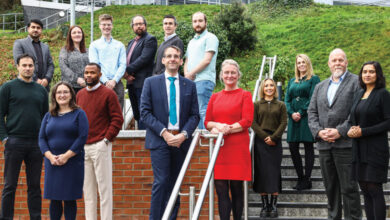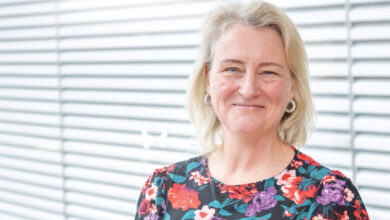Success in shared services
 Good leadership and communication are vital for successful shared services, as with change programmes in general, according to Paul Dowie from Scotland’s Improvement Service.
Good leadership and communication are vital for successful shared services, as with change programmes in general, according to Paul Dowie from Scotland’s Improvement Service.
The Improvement Service is, in Paul Dowie’s words, “a small organisation in a big sector.” Set up in 2005, it has 16 core staff and aims to help Scottish councils (32 in total with 260,000 employees) work together and bring about improvements in their work.
Dowie spoke about its remit at agendaNi’s ICT forum on shared services in October.
“Often we rail against how difficult it is to get local government to do things but the system is designed to work that way,” he commented in his introduction. “Local government is about local accountability so there is something rational in some of the behaviours and barriers that we see. This is about independent organisations determining what’s best for their people and their place.”
Scotland’s sector has also gone through major changes over the last 10 to 15 years, including two large re-organisations and the introduction of PR elections. That, in itself, shows that further reform is possible.
“We have been through a lot of change – some we managed well, some hasn’t been done so well – but we must remember that we have done that successfully so therefore we can address the challenges that are there moving forward and we have got capacity and skills to pull on as we move forward.”
Going forward, capital funding will fall and councils (responsible for social care in Scotland) can expect an exponential increase in demand due to an ageing population.
“Doing the right thing and doing the thing right” are both important and Dowie emphasised that shared services are “not just transactional” but have the potential to re-invent and transform public services.
Results
“We have to focus on transforming service delivery and not see shared services as an end in themselves,” he explained.
Shared services, in his view, must be seen as medium- to long-term investments, as very few currently pay back in less than four or five years. The shared service approach is also just one of several ways to implement change.
High-level leadership from ministers and chief executives is important but support must also filter down to all levels e.g. each human resources manager in each council for myjobscotland (a local government jobs portal).
“It isn’t just about how you tell from the top. It’s about how you get things to happen on the ground,” Dowie stated.
Rolling out a standard programme across several councils can also mean that the more advanced IT departments have to ‘unpick’ a lot of the integrations they have already done within their organisation.
There is also potential for a tension between aggregation – i.e. cutting costs in the short term – and integration of services, which can benefit citizens in the long term.
“Most change initiatives don’t deliver what’s expected of them … we all know why,” he continued.
“It is those leadership issues, it is about the vision, it is about being clear about why are doing things. We always have to come back to why are we doing something and how do we design the change well if we are really serious about getting the financial returns and benefits from the investments that we make.”
Pointing out what has happened elsewhere also proves what can be achieved.
Wiltshire Council, for example, used lean and systems thinking to reduce the cost of adult social care by 30 per cent; customer satisfaction still improved. The Improvement Service researches these models and brokers relationships across councils.
In the Clyde Valley, eight councils are looking at how to share waste management and back office services. The service has a frank discussion with customers at the start of the project so that they do not waste time preparing a project which will eventually be turned down. An early clear decision to not go ahead is as important as an approval.
Dowie characterises this approach as: “We want to understand what your level of commitment is and actually if you’re not committed then we don’t want to start the journey with you.”
Shared services in local government can also be seen as assets for the wider public sector, especially with the forthcoming budget constraints.
“Nobody can afford to build the same infrastructure twice and there are real opportunities for us to make savings together,” he said. “I as an individual don’t necessarily go through a council site or a national site. I’m looking for something that is convenient for me.”
Scotland does not have a “huge track record or appetite for outsourcing” but this may soon change as councils assess which services are core and which can be done by others.
“The imperative has never been greater but shared services isn’t the immediate answer,” he remarked in conclusion. “It’s not going to solve the two to three year problem so we need to be careful about the positioning of shared services, the investment necessary to make it happen and the priority and leadership put into that as opposed to some of the other things that we need to do.”
Speaking to agendaNi afterwards, he stressed the need to look at the basic questions for a project e.g. why, what, when? and also the importance of full communication with staff.
“If you cannot answer this, then that’s a good indicator of whether you’re on the path to success or not,” he commented.
“You cannot assume that the messages have been communicated to everybody. Does your management at all levels understand what the priorities are and what’s expected of them and [have] a clear sense that you’re serious?”
An improvement in practice
Part of the Customer First programme, Scotland’s national entitlement card is a single, multi-application smartcard which proves that a holder is entitled to a range of local government services e.g. concessionary travel, libraries, leisure facilities and cashless catering in schools.
More than £4 million has been saved through collaborative procurement and development. For young people, the card carries a Proof of Age Standards Scheme (PASS) hologram, which is accepted as proof of identity when opening a basic bank account.
“It means they don’t have to carry six or seven separate pieces of plastic with them just to get the services they’re entitled to,” said Louise Macdonald, Chief Executive of the Young Scot charity. “This is a major service enhancement for young people.”
More information on the Improvement Service can be found at www.improvementservice.org.uk





